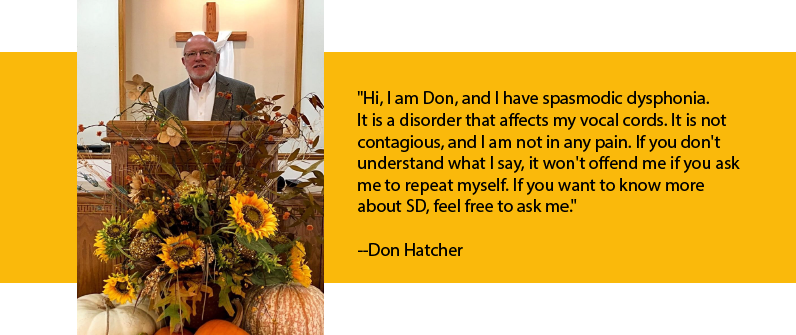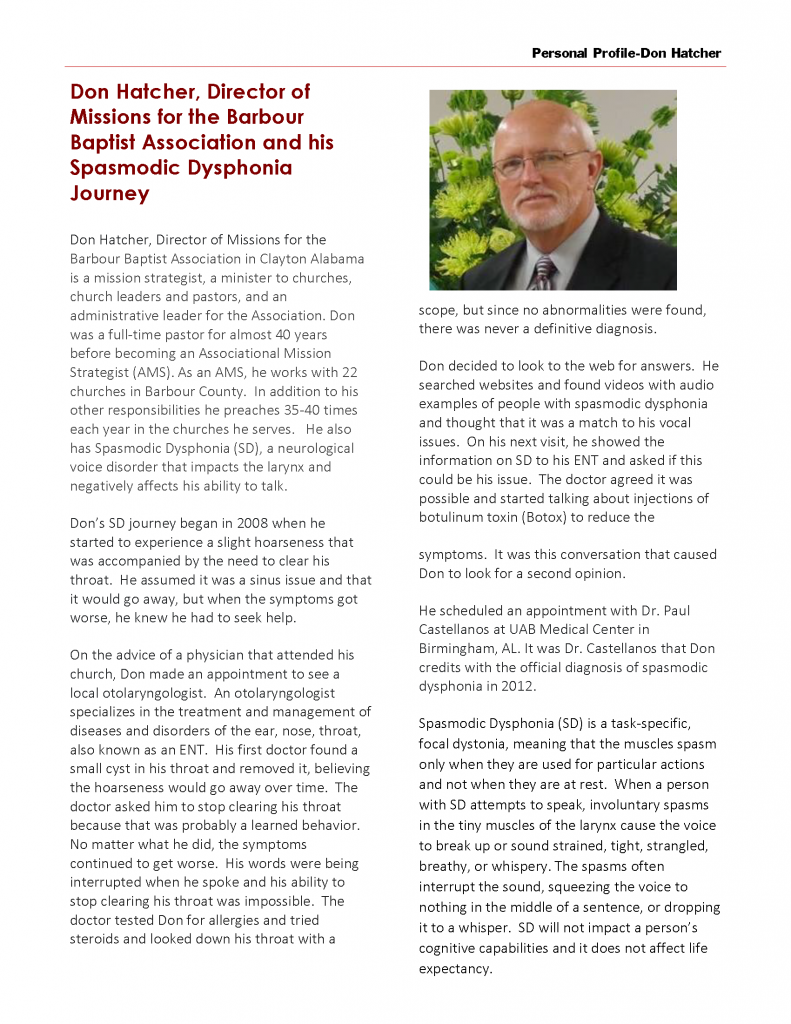Don Hatcher, Director of Missions for the Barbour Baptist Association and his Spasmodic Dysphonia Journey
Don Hatcher, Director of Missions for the Barbour Baptist Association in Clayton Alabama is a mission strategist, a minister to churches, church leaders and pastors, and an administrative leader for the Association. Don was a full-time pastor for almost 40 years before becoming an Associational Mission Strategist (AMS). As an AMS, he works with 22 churches in Barbour County. In addition to his other responsibilities he preaches 35-40 times each year in the churches he serves. He also has Spasmodic Dysphonia (SD), a neurological voice disorder that impacts the larynx and negatively affects his ability to talk.

His journey begins
Don’s SD journey began in 2008 when he started to experience a slight hoarseness that was accompanied by the need to clear his throat. He assumed it was a sinus issue and that it would go away, but when the symptoms got worse, he knew he had to seek help.
On the advice of a physician that attended his church, Don made an appointment to see a local otolaryngologist. An otolaryngologist specializes in the treatment and management of diseases and disorders of the ear, nose, throat, also known as an ENT. His first doctor found a small cyst in his throat and removed it, believing the hoarseness would go away over time. The doctor asked him to stop clearing his throat because that was probably a learned behavior. No matter what he did, the symptoms continued to get worse. His words were being interrupted when he spoke and his ability to stop clearing his throat was impossible. The doctor tested Don for allergies and tried steroids and looked down his throat with a scope, but since no abnormalities were found, there was never a definitive diagnosis.
Don finds SD on the internet
Don decided to look to the web for answers. He searched websites and found videos with audio examples of people with spasmodic dysphonia and thought that it was a match to his vocal issues. On his next visit, he showed the information on SD to his ENT and asked if this could be his issue. The doctor agreed it was possible and started talking about injections of botulinum toxin (Botox) to reduce the symptoms. It was this conversation that caused Don to look for a second opinion.
He scheduled an appointment with Dr. Paul Castellanos at UAB Medical Center in Birmingham, AL. It was Dr. Castellanos that Don credits with the official diagnosis of spasmodic dysphonia in 2012.
Spasmodic Dysphonia (SD) is a task-specific, focal dystonia, meaning that the muscles spasm only when they are used for particular actions and not when they are at rest. When a person with SD attempts to speak, involuntary spasms in the tiny muscles of the larynx cause the voice to break up or sound strained, tight, strangled, breathy, or whispery. The spasms often interrupt the sound, squeezing the voice to nothing in the middle of a sentence, or dropping it to a whisper. SD will not impact a person’s cognitive capabilities and it does not affect life expectancy.
Treatment begins
Dr. Castellanos began with voice therapy. This is often done to help confirm diagnosis before beginning Botox. The voice therapy did nothing to impact his vocal quality. As a result, he then recommended that Don try Botox.
Don had his first Botox injection soon afterwards. It left him unable to speak above a whisper for more than 4 months. “I expected clarity in my speech after a couple of weeks. When that did not happen, Dr. Castellanos encouraged me to keep trying, but warned that it might take a couple of injections to find my perfect location and the correct levels.” Like so many with SD, Don decided not to have another injection of Botox. He thought it was better to just live with the disorder and carry-on his ministry the best he could with the voice he had.
His daily struggle
SD causes daily struggles with verbal communication. He struggles with clarity while speaking on a phone. It’s difficult to carry on a face-to-face conversation in a normal tone of voice and has compensated by talking in a near whisper. He struggles with not being understood when among strangers who don’t know about SD or when ordering food at a restaurant. He says it is embarrassing to try to be understood while I am having to force my speech so that it isn’t riddled with breaks.
“While I have never felt depressed, I have at times felt isolated, especially when I am in a group setting, and I hesitate to contribute to a conversation or if I do not know the other people in the group very well,” says Don.
He meets someone else with SD
There are no support groups in Alabama, so Don never knew anyone with SD until recently. A retired minister who read an article about Don in The Alabama Baptist newspaper, contacted him. He has had SD since he was 25-years-old and still receives Botox injections once every 3-4 months. He was among the first patients to receive treatment at the Emory Voice Clinic in Atlanta and encouraged Don to resume his search for treatment. “I could not believe how clearly he spoke over the phone. I would have never known he had SD had he not told me. He told me it took 2-3 injections before the doctor got it right.” Since that conversation, Don has decided to aggressively seek treatment, whether at Emory or elsewhere.
Since getting his diagnosis, the NSDA’s e-Voice and Our Voice newsletters are his must-reads. He anticipates their arrival and reads them from cover to cover. He especially enjoys reading the interviews with people who tell how SD has impacted their lives and how they are coping with it. He would one day like to attend a symposium.
Acceptance
Don believes that being a preacher has impacted his personal acceptance of the disorder. He is very open in talking to people about SD. In fact, when he is in a larger group meeting with his peers, it is not unusual to introduce himself this way: “Hi, I am Don, and I have spasmodic dysphonia. It is a disorder that affects my vocal cords. It is not contagious, and I am not in any pain. If you don’t understand what I say, it won’t offend me if you ask me to repeat myself. If you want to know more about SD, feel free to ask me.”

Because, as Don would say, he is a high D (dominant) on the DISC Personality Profile, SD has not really changed how he behaves in the church. “I am outgoing and task-oriented. I am a take-charge leader. SD has not changed that. I cannot think of any situation where SD has caused me to adjust my leadership style. But what has changed is my attitude toward myself.” At first, he assumed that he was disabled and would never be as effective in ministry. After all, a minister’s voice is paramount in fulfilling his calling. After several “come-to-Jesus” meetings, he realized that his diagnosis of SD was no surprise to God. He references a Bible verse…”And we know that all things work together for good to those who love God, who are the called according to His purpose.” (Romans 8:28 NKJV) “By the way”, Don says, “when I do preach, I speak with clarity.”
SD has also caused Don to not take a clear voice for granted. It has birthed a dream that one day he will have a voice that will be clearly understood when he speaks to his seven young grandchildren. It has caused him to want to educate himself about SD, not only for his benefit, but for the benefit of others with whom he might come in contact who are unaware of the fact that such a vocal disorder as SD exists. He is also interested in starting an SD support group in Alabama.
When asked if he had any advice for someone struggling with SD, Don said, “my advice would be for them to not get discouraged and to not withdraw. It isn’t the end of life. A ship is not sunk by the water around it. It is sunk by the water that gets in it. A person who struggles with SD can be tempted to focus on the disadvantages of the disorder to the point that their mind-set becomes negative. When that happens, they are hamstrung … made powerless and ineffective … in their pursuits in life. Summing it up, I would say, get over it! There is hope!!! SD does not have to define a person. It doesn’t have to dictate a lifestyle.”



